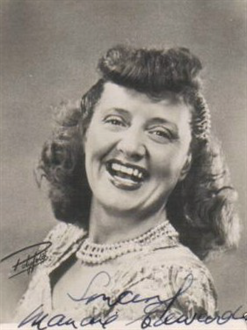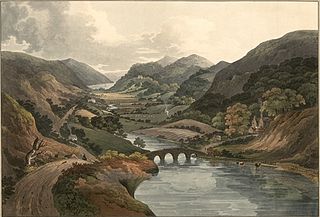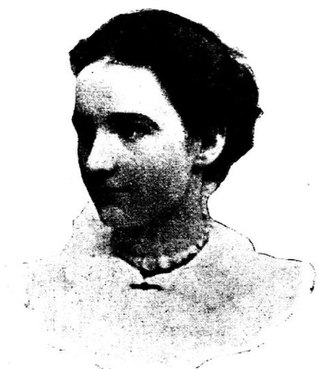Related Research Articles

Welsh writing in English, is a term used to describe works written in the English language by Welsh writers.

Penrhyndeudraeth is a small town and community in the Welsh county of Gwynedd. The town is close to the mouth of the River Dwyryd on the A487 nearly 3 miles (4.8 km) east of Porthmadog, and had a population of 2,150 at the 2011 census, increased from 2,031 in 2001. The community includes the villages of Minffordd and Portmeirion.
This article is about the particular significance of the year 1959 to Wales and its people.

Ifor Davies, born Ivor Davies, was a Welsh Labour politician who was the MP for Gower from 1959 until his death.

Elizabeth Maud Edwards, professionally known as Maudie Edwards, was a Welsh actress, radio broadcaster, comedian, dancer and singer, best remembered for having spoken the first line of dialogue in soap opera Coronation Street, and playing Elsie Lappin in the first two episodes. She was previously best known to listeners of the radio programme Welsh Rarebit, which attracted weekly audiences of 10 million.
The Dictionary of Welsh Biography (DWB) is a biographical dictionary of Welsh people who have made a significant contribution to Welsh life over seventeen centuries. It was first published in 1959, and is now maintained as a free online resource.
William Henry Davenport Adams (1828–1891) was an English writer and journalist of the 19th century, notable for a number of his publications.

Elizabeth Watkin-Jones was a Welsh children's book author, who wrote in the Welsh language.
Ifor Owen was a Welsh educator who was notable for writing, illustrating and publishing Hwyl, the first children's comic book in the Welsh language.

Sarah Jane Rees, also known by the bardic name "Cranogwen", was a Welsh teacher, poet, editor, master mariner and temperance campaigner. She had two romantic friendships with women, first with 'Phania' Fanny Rees, until her death from tuberculosis, then with Jane Thomas, for most of the rest of Rees's life.
Norah Isaac was a Welsh author, drama producer and campaigner for Welsh-language education. She became head of the country's first Welsh-medium school, Ysgol Gymraeg yr Urdd, in 1939.
Mia Arnesby Brown, née Mia Edwards (1867–1931) was a Welsh painter. She was particularly noted for her portraits of children.
Catherine "Caryl" Glyn Davies was a Welsh historian of philosophy and linguistics, and a translator.

Mary Evans, known as Mari y fantell wen was the leader of a short-lived religious sect in Wales whose followers held that she was married to Christ and would never die. The sect soon dissolved after her death.

Llanfihangel-y-traethau was a parish in Ardudwy, Gwynedd, north-west Wales centred on a church of the same name in the village of Ynys. The original parish church was built in the 12th century on a tidal island. Later the land rose and connected the island to the mainland. Today it is part of the Bro Ardudwy ministry area, which includes Harlech, a few miles (kilometres) to the southwest, and Barmouth. The church has a window depicting Saint Tecwyn and is the start of the Saint Tecwyn's Way, a pilgrimage route ending at Saint Tecwyn's church in Llandecwyn.

Sarah Winifred Parry was a Welsh writer most known for developing the modern Welsh short story. She used her nickname Winnie Parry as her pen name. She became a household name with her serialized fiction in periodicals at the turn of the twentieth century. Her most acclaimed work, Sioned, first published as a serial between 1894 and 1896 was introduced as a novel in 1906 and was reissued in 1988 and 2003.
Eigra Lewis Roberts is a Welsh-language author of about 30 plays, short stories, children's books and novels. She has won several awards at the National Eisteddfod of Wales.
Gweneth Lilly was a Welsh writer and teacher who authored novels, children's and teenage books and adult books in English and Welsh. She worked as a teacher at the University of Liverpool and later at St. Mary's College in Bangor until she retired in 1977 to focus on writing on which she authored 13 books in her lifetime. Lilly won the Tir na n-Og Award twice in 1981 and 1982. The Bangor University Archives holds a collection of works related to the writer.
References
- ↑ "Transcribed index of English and Welsh birth registrations". FreeBMD. ONS. Retrieved 4 April 2016.
- ↑ "Transcribed index of English and Welsh death registrations". FreeBMD. ONS. Retrieved 4 April 2016.
- 1 2 3 4 5 6 7 8 Arwyn Lloyd Hughes, Llandaf. "Edwards, Fanny Winifred (1876–1959)". Dictionary of Welsh Biography . National Library of Wales . Retrieved 4 April 2016.
- 1 2 John William Jones, (1884–1954), Blaenau Ffestiniog. "Edwards, William Thomas (Gwilym Deudraeth : 1863–1940)". Dictionary of Welsh Biography . National Library of Wales . Retrieved 4 April 2016.
{{cite encyclopedia}}: CS1 maint: multiple names: authors list (link) CS1 maint: numeric names: authors list (link) - ↑ "The Industrial Revolution – The debate about whether the industrial revolution was a good or a bad thing for the Welsh language will probably last as long as Welsh itself". Welsh history. BBC Wales, Cardiff. 2014. Retrieved 4 April 2016.